Friday, February 28, 2025. Annette’s Roundup for Democracy.
Today is the Day.
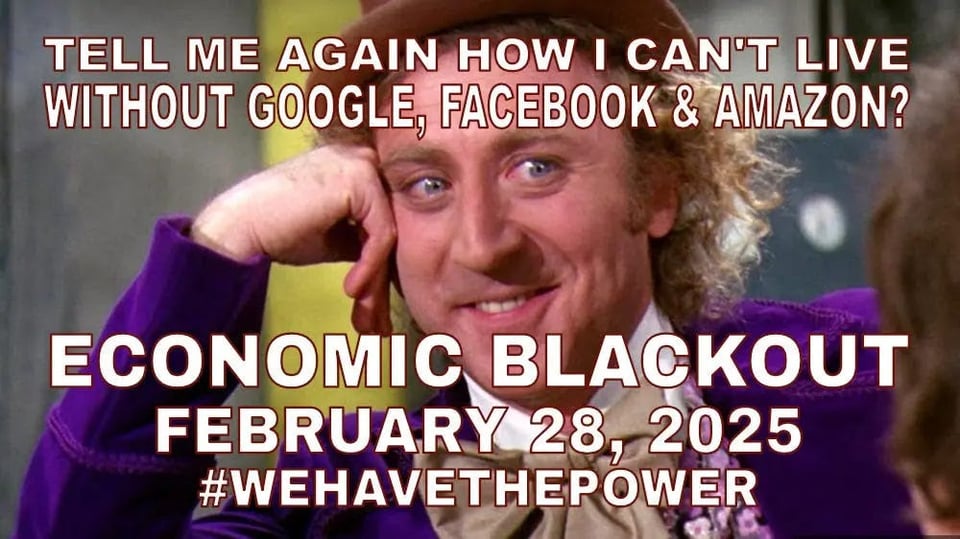
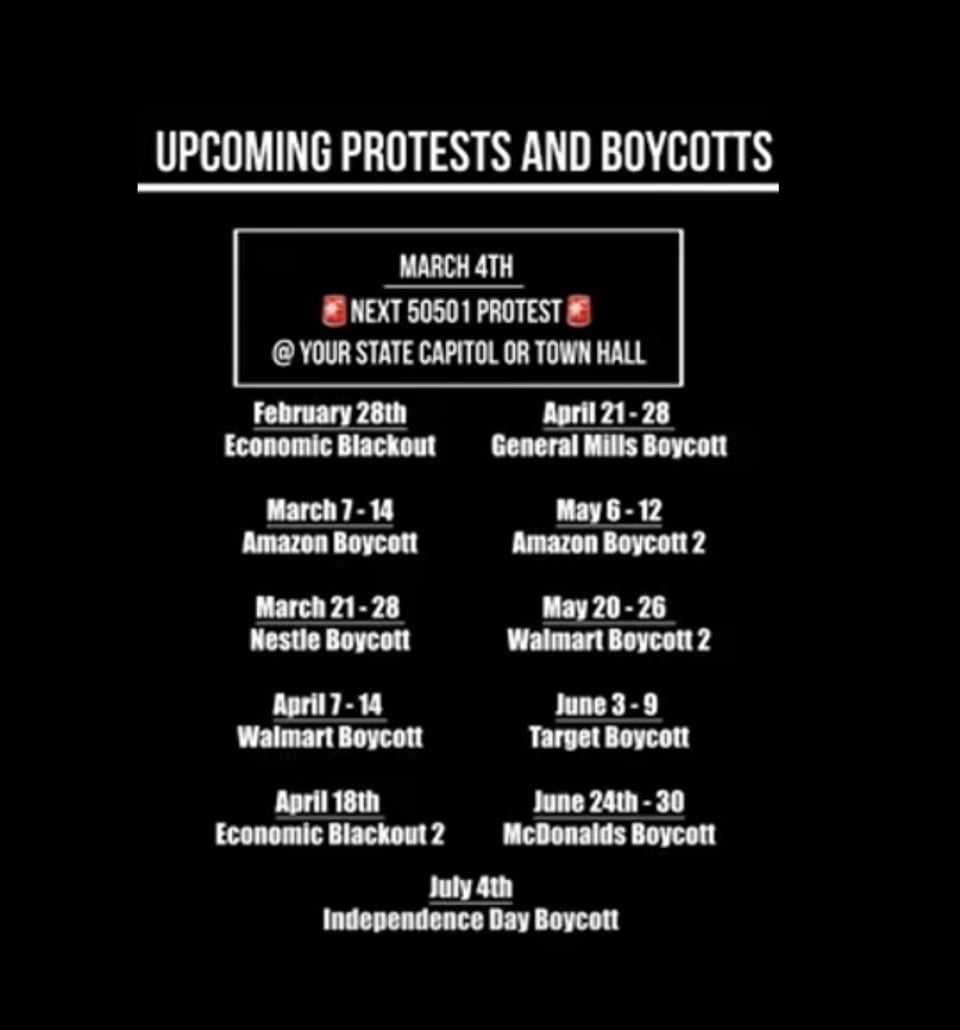
The Supreme Court allowed a Trump action to continue but don’t read too much into it.
Worry less. Do more.
The Supreme Court just got a new case about Trump’s biggest power grab | Vox
Trump’s lawyers just revealed their plan to place him in charge of federal spending.
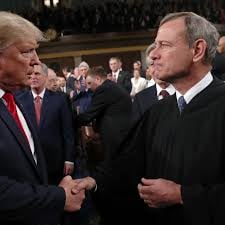
Donald Trump and Supreme Court Chief Justice John Roberts, State of the Union, 2020.
On Wednesday night, Chief Justice John Roberts temporarily halted a lower court order, which would have required the Trump administration to make approximately $2 billion in foreign aid payments that it had stopped as part of a broader attack on the US Agency for International Development (USAID).
It’s important not to read too much significance into Roberts’s temporary order in this case, known as Department of State v. AIDS Vaccine Advocacy Coalition. Judges often have the power to hit “pause” on a case while they take more time to figure out how the law requires them to act — indeed, many of the lower court judges who’ve halted Trump administration policies relied on similar authority when they did so. It’s likely that Roberts issued Wednesday’s order to give himself and his colleagues more time to consider the questions presented by the AIDS Vaccine case.
But the current dispute before the Supreme Court is significant for at least two reasons. The first: It is the first Trump-era case involving impoundment, a legally dubious claim that the president may cancel federal spending that is mandated by laws enacted by Congress. The Impoundment Control Act of 1974 places very strict limits on the president’s ability to second-guess Congress’s spending decisions — typically the president must seek permission from Congress before canceling spending.
But Trump has nonetheless claimed the power to do so without legislative approval.
The second reason is that, in a document Trump’s Justice Department recently filed in the Supreme Court, Trump’s legal team seems to reveal how they plan to get around the Impoundment Control Act and similar rules requiring the president to obey federal spending laws.
Significantly, the Trump administration does not argue — at least not yet — that the president has the inherent constitutional authority to impound funds. Indeed, the DOJ’s recent filing does not even argue that Trump’s decision to halt USAID spending is legal. Instead, the Trump administration suggests that federal courts lack the authority to issue broad orders reinstating whole swaths of government spending canceled by the administration, and that these cases must instead be resolved on a piecemeal basis.
Think of it this way: Suppose that the Trump administration issues an illegal order forbidding the government to pay any contractor named “Susan.” Now suppose that 10,000 Susans who are owed money by the federal government seek a single court order declaring this anti-Susan policy illegal. The Trump administration’s legal arguments suggest that such a court order is not allowed, and each Susan may need to bring their own individual legal proceeding to get paid.
Needless to say, this tactic could significantly hinder efforts to make the Trump administration comply with federal spending laws. If the Supreme Court embraces the administration’s arguments, Trump and his subordinates would remain free to issue blanket orders canceling entire categories of federal spending. Meanwhile, anyone impacted by these cancellations would potentially need to retain their own legal counsel, determine which court or federal agency has jurisdiction over their claim, and then bring a proceeding that could take months or years to resolve. Many of these potential litigants may simply give up. Others could go out of business while waiting for the government to pay what it owes.
The president is not allowed to impound funds appropriated by Congress.
The question of whether a president may simply refuse to spend money that Congress has ordered the executive branch to spend is very easy to resolve. As future Chief Justice William Rehnquist wrote in a 1969 Justice Department memo, “it is in our view extremely difficult to formulate a constitutional theory to justify a refusal by the President to comply with a congressional directive to spend.”
There’s simply nothing in the Constitution which supports the claim that the president may impound funds. And there are several provisions of the Constitution that cut against this claim, including one which states that the president “shall take care that the laws be faithfully executed.” That provision imposes a duty on the president to faithfully execute any law calling for federal spending.
At least two members of the Supreme Court’s current Republican majority, moreover, have previously indicated that they agree with Rehnquist’s 1969 memo. As a White House attorney in 1985, Roberts wrote that it is “clear” that the president cannot impound funds in “normal situations” (though he did, in a potentially ominous sign for USAID, suggest that the president’s authority may be greater in cases involving foreign affairs). Roberts added that “no area seems more clearly the province of Congress than the power of the purse.”
Similarly, Justice Brett Kavanaugh wrote in a 2013 opinion, when he was still a lower court judge, that “even the President does not have unilateral authority to refuse to spend” funds appropriated by Congress.
Nevertheless, Trump signed sweeping executive orders seeking to halt federal spending. That includes a January 20 order purporting to impose a “90-day pause in United States foreign development assistance for assessment of programmatic efficiencies and consistency with United States foreign policy,” as well as a domestic spending order so broad that it seemed to freeze Medicaid (although the White House backed off that policy somewhat after it triggered a bipartisan backlash).
The AIDS Vaccine case offers this Supreme Court its first opportunity to weigh in on Trump’s efforts to halt federal spending. The Justice Department’s narrow arguments suggest that, at the very least, Trump’s lawyers would prefer to delay a broader showdown over whether Trump can simply cancel any funding he wants.
So what’s the specific question before the Court in AIDS Vaccine?
The specific dispute before the justices right now arises out of a pair of orders issued by federal District Judge Amir Ali. The first indicated that the Trump administration’s blanket suspension of USAID funding was illegally arbitrary because the administration has not “offered any explanation for why a blanket suspension of all congressionally appropriated foreign aid…was a rational precursor to reviewing programs” for inefficiency or noncompliance with Trump’s policy goals.
Accordingly, Ali temporarily forbade the administration from “suspending, pausing, or otherwise preventing the obligation or disbursement of appropriated foreign-assistance funds” that had been authorized as of January 19.
The second order sought to enforce the first one, by requiring the State Department and USAID to “pay all invoices and letter of credit drawdown requests on all contracts for work completed prior to the entry of the Court’s [first order] on February 13.”
The bulk of the Trump administration’s brief to the justices, meanwhile, argues that Ali lacks jurisdiction over this case, and that Ali’s orders were also too broad because they sought to reinstate payments that aren’t owed to the specific plaintiffs who brought the AIDS Vaccine case. Again, Ali’s second order requires the State Department to “pay all invoices” for work completed prior to a specific date, even if that work wasn’t done by the AIDS Vaccine plaintiffs.
At least some of these claims are plausible. The Justice Department, under both the Biden and Trump administrations, has long railed against “nationwide injunctions” — lower court orders which suspend a federal policy on a nationwide basis, rather than issuing more narrowly tailored relief to individual plaintiffs. Some members of the Court, most notably Justice Neil Gorsuch, are passionate advocates of the view that broad, nationwide relief must be curtailed. (I have also argued that Gorsuch’s stance against nationwide injunctions has significant merit.)
But a Supreme Court decision preventing judges from issuing broad injunctions would also give the Trump administration considerable leeway to act illegally. Again, the administration would be free to issue broad new policies canceling funding that impacts millions of Americans. Then, even if the courts later determined that this new policy is illegal, the individuals and businesses who are owed money would have to bring their own proceedings demanding repayment.
Some of this imbalance could be resolved through class actions — lawsuits which allow multiple parties with similar legal claims to join together in the same proceeding. But there are also limits on who can bring such class actions, and it’s unclear whether multiple parties seeking to enforce multiple contracts with different terms would be able to show that their cases are sufficiently similar to permit a class action to move forward.
All of which is a long way of saying that the courts are unlikely to fully constrain a president who is determined to cancel federal spending, even if he does so illegally. The executive branch is much more nimble than the judiciary, and this will be doubly true if the Supreme Court limits lower courts’ ability to block the Trump administration’s policies on a nationwide basis. (Vox).
Even his home town hates J.D.Vance.
His hometown paper calls Vance “lapdog vice president.”
Ohio's J.D. Vance rebuked by the Pope, denounced by NATO allies, ridiculed for bizarre rant • Ohio Capital Journal
J.D. Vance has really done Ohio proud these last few weeks, hasn’t he? The lapdog vice-president, with evidently a lot of time on his hands, has managed to be firmly rebuked by Pope Francis, denounced by outraged NATO allies and widely ridiculed for his bizarre ‘masculinity’ rant at a weekend MAGAfest just a month into his tenure. Way to create a buzz/acute embarrassment back home!
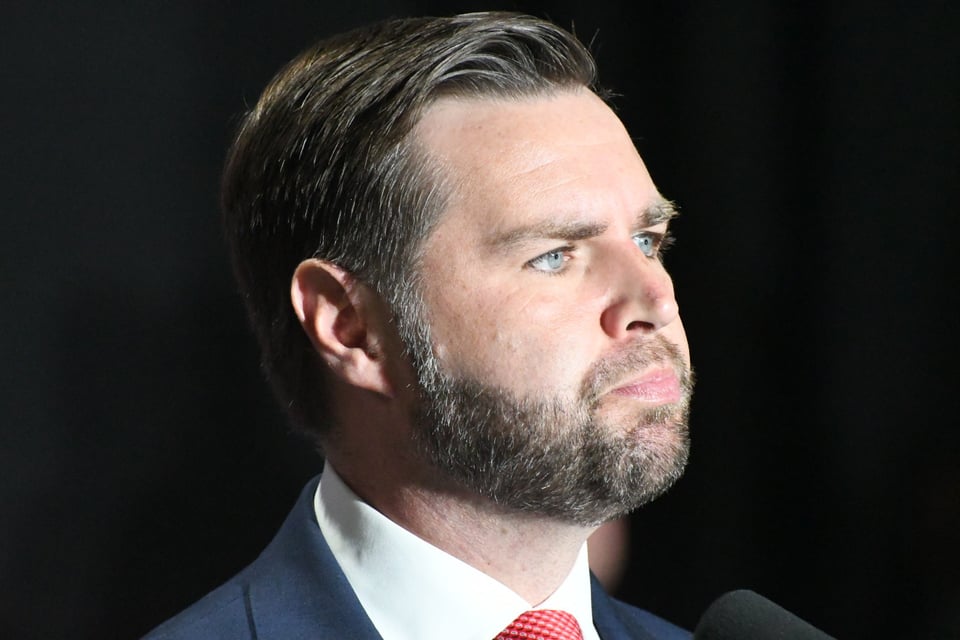
What is wrong with J.D.? Have the wheels come all the way off? Why does the 40-year-old awkwardly playing VP keep stepping in it stateside and abroad? Is the “childless cat ladies” charmer acting out unresolved rage from a bad place? Working through some deep-seated anger? Seriously, Vance manifests juvenile cringe, not sober sway, as he settles into his nondescript role as an appendage in the Trump-Musk administration. Even Trump won’t name him as a slam dunk heir apparent. Not good.
For a supposed Ivy League intellectual, Vance sure spouts stupidity on the regular: Honestly, you’ve got to be really off base on Catholic theology for the Vatican to correct your twisted take on love with descending priorities as justification for mass deportations. In Vance’s godawful reading of the Christian order of love concept; (to mesh with his political ideology) family, community, and country come first and everyone outside that concentric circle later or not so much. Which puts migrant families outermost from Vance’s construct on brotherly love for me but not thee from outside our borders.
Francis rejected the VP’s sophomoric theoretical defense of cruel immigration crackdowns as flatly wrong. He urged the misguided millennial to meditate on the parable of the Good Samaritan, “on the love that builds a fraternity open to all, without exception.” But “American citizens first” nativist Vance has no interest in building a “fraternity open to all,” just an all-white patriarchy focused on baby-making. To that point, he started a holy war (barely a week after inauguration) against charitable organizations across the country that feed, clothe and house refugees and immigrants (i.e., Catholic Charities and Catholic relief groups) by implying they perform their labor of love for federal money — not humanitarian concerns.
“Devout Catholic” convert Vance went all glib and combative on compassion and care for the “least of these” because they included Brown and Black mothers and fathers and children fleeing horrendous homelands for hope. But upholding the dignity of every human being (native-born or not) as a core tenet of Christianity clashes with the core MAGA mission to degrade, shackle and ship terrified families back to the foreign hellscapes they fled. Vance threw nasty and mean into the mix to look tough on dehumanized “illegals” and scorn mercy. He is a dutiful, if not decent, Trump toady.
But the swift rebuttals to Vance’s hollow broadsides from the Church and the pope himself only reinforced the veep’s smallness as a smug sycophant slinging ugly. Whatever reputation Vance may have enjoyed in the past as a thoughtful individual with at least a modicum of integrity is long gone. With a brief stint as a venture capitalist, an even briefer stint as Ohio senator and now VP, Vance is heady with power and hubris over his meteoric rise from bending the knee to a man he once derided as “America’s Hitler.” Then Vance went to the Munich Security Conference recently, not to collaborate with NATO allies on mutual security interests and Ukraine, but to turn on them.
Vance, the shameless election denier in service to an authoritarian regime lawlessly dismantling a democratic republic, had the towering audacity and historical blindness to lecture his European audience on democracy, downplay threats from Russia and China, and publicly court a far-right German party (AfD) that many Germans consider the heirs of Nazi ideas and that sanitizes the Holocaust. His blistering dress-down of European leaders, rightly dismayed over rising extremism and history repeating itself, coupled with his pronounced affection for far-right politicians a week before a crucial German election (U.S. election interference?) was obscene.
The last thing the world needs now is a U.S. vice-president trashing eighty years of foreign policy with America’s closest and most enduring friends. But that’s what a dangerously reckless Vance did on the world stage to compete with Elon Musk and boost his nascent brand as an uber-nihilist bent on destroying plurality for purity and seeding a new world order. It’s wing-nuttery on a disturbingly dark scale. But Vance, for all his performative bravado — whether it’s lashing out at European allies for not welcoming extremism, or engaging in petty posting on X, or weirdly obsessing about “the essence of masculinity” and a “broken culture” that tells you “You’re a bad person because you’re a man” — is a phony.
He morphed from Never-Trumper to groveling suck-up for unimagined power, but he can’t quite pull it off as a poser with a makeover beard spewing stupid and offensive and strange. Vance has been doing us proud by attacking friends, embracing enemies, insulting humanitarians, drawing papal ire, and pontificating laughably on what makes a man a man.
Seriously, what is wrong with J.D.?
Remember the growing anger at this past weekend’s Town Halls?
Both red and blue states have federal employees whose lives and livelihoods are being destroyed by Trump-Musk.
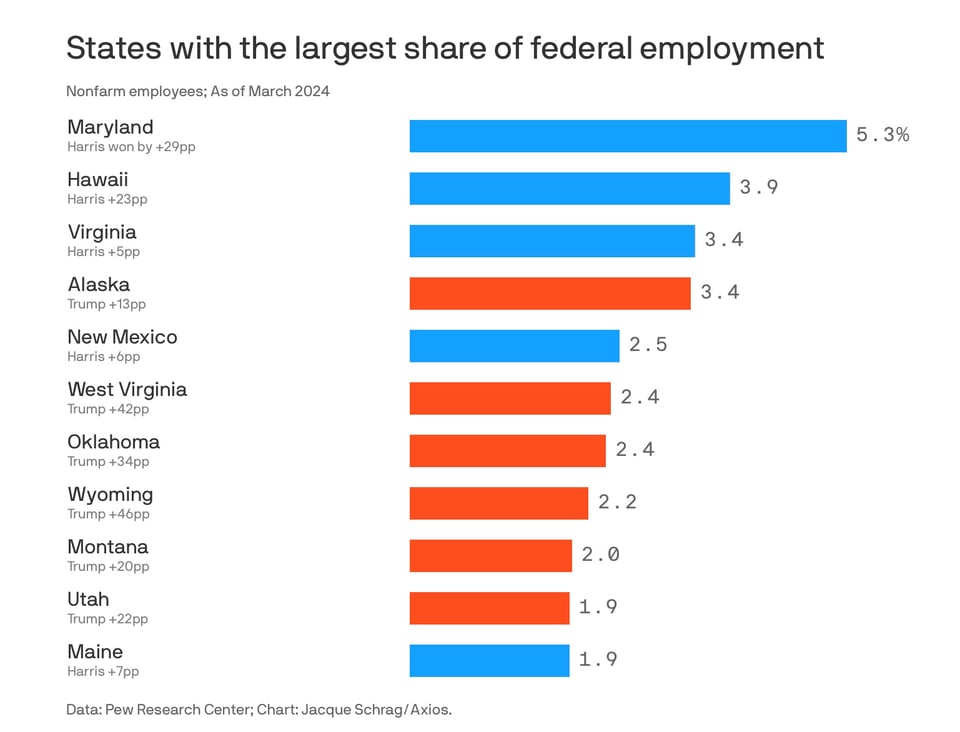
Here’s the GOP’s response.👇

Adam Kinzinger on Substack: "Hiding from the public sounds like a great 2026 re-election strategy for Republicans DEMAND A TOWN HALL FROM YOUR GOP CONGRESSMAN "
Hiding from the public sounds like a great 2026 re-election strategy for Republicans DEMAND A TOWN HALL FROM YOUR GOP CONGRESSMAN
Here is what is happening at one Democrat’s Town Hall. 👇
Incredible energy at my town hall in Aurora.
— Rep. Jason Crow (@RepJasonCrow) February 28, 2025
Thank you to the over 1,300 folks who have come to hear how we’re fighting back against President Trump’s executive orders and budget. pic.twitter.com/QAQB1KlYR3
I will tune into this on Tuesday, March 4.
BIG: I’m announcing @SenatorSlotkin will deliver our Democratic response to Trump’s Joint Address.
— Chuck Schumer (@SenSchumer) February 27, 2025
Nothing short of a rising star in our party—she’s dedicated her life to our country.
She will layout the fight to tackle the deep challenges we face and chart a path forward. pic.twitter.com/wcvy1lkQjP
Who is Elissa Slotkin?
From 2019 to 2025, Democrat Elissa Slotkin served as the U.S. representative for Michigan's 7th congressional district. She was elected to the Senate in 2024.
Fluent in Arabic and Swahili, Slotkin served three tours in Iraq as a CIA analyst.
During the George W. Bush administration, she worked on the Iraq portfolio for the National Security Council. During Barack Obama's presidency, she worked for the State Department and the Department of Defense.
Slotkin was acting assistant secretary of defense for international security affairs from 2015 to 2017. (Source. Wikipedia).
In Europe, change is happening.
Our oldest ally, Britain, is trying to figure out how to play Trump.
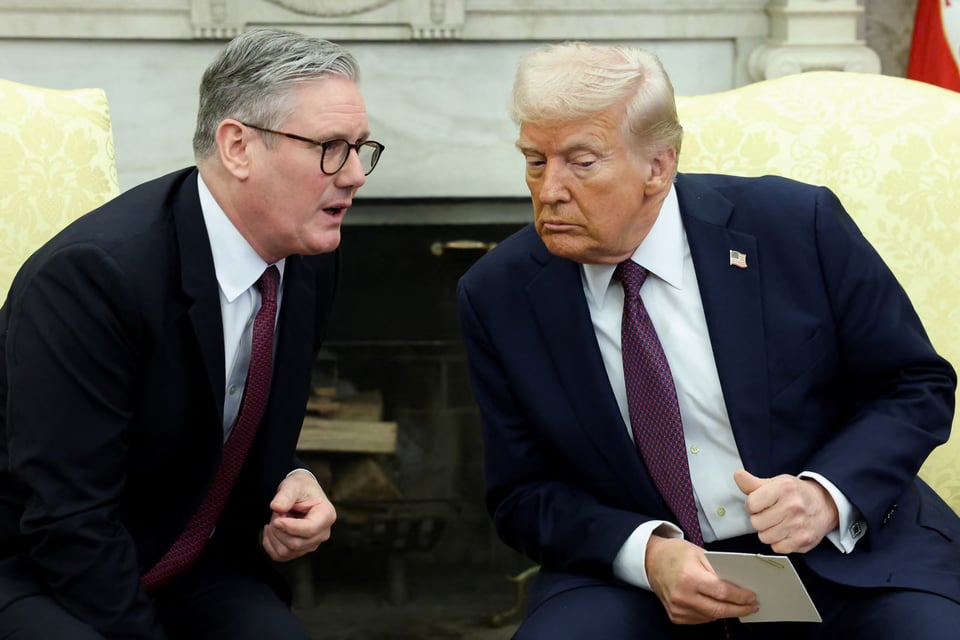
Donald Trump’s meeting with Keir Starmer: key takeaways.
Britain’s prime minister is potentially one of the European leaders best placed to handle the mercurial president.
Keir Starmer’s meeting with Donald Trump this week comes at a crucial moment for the war in Ukraine and the future of the Nato alliance. Europe is looking for leaders who can engage Trump on the future of the continent as the US leader appears more inclined to demand tribute from his allies and cosy up to Vladimir Putin. Sir Peter Westmacott, a former British ambassador the US, has called this one of the “most consequential meetings of a British prime minister and president that we have had since the second world war”.
Can the “special relationship” between the US and the UK save the day? Or has the era of transatlantic cooperation ended in the era of “America first”? Starmer has already established a friendly rapport with Trump and comes bearing promises to raise defense spending and negotiate on trade, but can that overcome Trump’s impulse to abandon Europe and strike a deal with Russia to end the war as quickly as possible?
Trump is notoriously mercurial. His decisions are said to be influenced by the last person with whom he spoke. On Thursday, that person will be Starmer, who comes to the White House on the heels of France’s Emmanuel Macron to try his best to argue Europe’s case to the new US president.
Here are six takeaways as Thursday’s meeting at the White House gets under way.
- A charm offensive with an invitation from King Charles.
Trump greeted Starmer amicably as the UK prime minister arrived at the White House, where the US president said that the two got along “famously” and called the US-UK relationship “tremendous”.
In an opening gambit, Starmer produced a letter from King Charles inviting Trump to visit the UK. “It’s an invitation for a second state visit. This is really special. This has never happened before. This is unprecedented,” Starmer said. Trump mused of Charles: “He’s a really great gentleman.”
In his opening remarks, Starmer thanked Trump for making peace possible in Ukraine in a sign that the prime minister will limit his criticism of Trump’s sharp diplomatic turn away from Europe and the previous administration’s support for Ukraine.
“Thank you for changing the conversation to bring about the possibility that now we can have a peace deal,” Starmer said. “And we want to work with you to make sure that peace deal is enduring, that it lasts, that it’s a deal that goes down to, historic deal that nobody reaches. And we’ll work with you to make sure that that absolutely happens.”
- Did Starmer manage to shift Trump on Ukraine?
Trump’s remarks following the meeting indicated that his views may have shifted ever-so-slightly on Ukraine following the meeting with Starmer. He did not repeat his statement that Zelenskyy was a “dictator”, said that he respected the Ukrainian leader, and added that Ukrainians had “fought very bravely ... somebody has to use that equipment and they have been very brave”.
Trump also appeared to be shifting in his opening remarks when he said that his plan to sign a rare earth minerals deal with Volodymyr Zelenskyy on Friday is “really going to get us into that country”. He indicated that the presence of American workers in Ukraine would provide a security guarantee for Ukraine because “we’ll be working there”.
“We’ll have a lot of people working and so in that sense, it’s very good,” he said. “It’s a backstop. You could say, I don’t think anybody’s going to play around if we’re there with a lot of workers and having to do with rare earths and other things which we need for our country.”
That is not the kind of security guarantee that Ukrainian, French or British officials have envisioned as backing European peacekeepers in the country in the event that a ceasefire deal is reached. But it is the closest that Trump has come to saying that the US would engage in Ukraine’s security and provide a deterrent threat against Russia restarting the war if a ceasefire were signed.
- Good signs for Starmer on tariffs and the Chagos Islands.
There were positive signs for Starmer that Trump would not slap harsh tariffs on trade with the UK, as Trump praised his lobbying and said Starmer “earned whatever the hell they pay him over there”.
“I think there’s a very good chance that, in the case of these two great friendly countries, I think we could very well end up with a real trade deal where the tariffs wouldn’t be necessary,” Trump said. “We’ll see.”
Trump also offered Starmer an early win by saying that he would likely support a plan for the UK to cede control over the strategic Chagos Islands in the Indian Ocean to Mauritius but then lease them back to maintain control over a strategic airbase used by the US and the UK.
The proposal to cede control over the archipelago had been mired in uncertainty after a general election led to a change of government in Mauritius and Starmer faced criticism at home for the deal to cede control over the series of atolls in the Indian Ocean that have been described as Britain’s last African colony. On the eve of the summit, David Lammy admitted that Trump had an effective veto over the deal, saying: “If President Trump doesn’t like the deal, the deal will not go forward.”
“We’re going to have some discussions about that very soon, and I have a feeling it’s going to work out very well,” said Trump. “They’re talking about a very long-term, powerful lease, a very strong lease, about 140 years. Actually, that’s a long time, and I think we’ll be inclined to go along with your country. We have to be given the details, but it doesn’t sound bad.”
- Keir Starmer is appealing to Trump’s checkbook, not to his heart.
The key pledge that Starmer has made en route to Washington is to raise defense spending to 2.5% of gross domestic product by 2027, and then to 3% by 2035. He has called it the “biggest sustained increase in defense spending since the end of the cold war”.
That firm commitment is seen as the enticement to convince Trump to provide a “backstop” to a European security guarantee to Ukraine that would restrain Russia from breaking a potential ceasefire. “The security guarantee has to be sufficient to deter Putin,” Starmer told reporters on his plane en route to Washington.
But in remarks at the British ambassador’s residence on Thursday, Starmer and his ambassador to the US, Peter Mandelson, also focused on the economic ties and opportunities for investment that exist between the UK and US. “We’re determined to help US innovators thrive in the United Kingdom so my message is we want to work with you, we want to welcome you to Britain, we want a new partnership because history shows that when we work together, great things happen,” Starmer said.
Ultimately, Starmer will need to convince Trump that support for Ukraine and Nato is a good deal, and he will argue his position as a win-win transaction rather than an obligation or duty to world security that previous leaders in the United States used to believe.
- Starmer’s tightrope walk.
Starmer followed Macron’s lead in his visit earlier this week by correcting Trump during his remarks to say that Europe had mainly gifted its financial support to Ukraine and had not given most of the aid in the form of loans.
“We wanted to have a little bit of what the European nations had,” Trump said of his decision to demand Ukraine pay back the US for it support. “They get their money back by giving money, we don’t get our money back.”
“We’re not getting all of ours, quite a bit of ours was gifted, it was given. There were some loans but mainly it was gifted actually,” Starmer said.
Starmer trumpeted the “special relationship” between the United Kingdom and the US in defense and in business, but also directed some good-natured barbs at current administration officials, wryly commenting on the “buzz” in Washington these days and speaking about a new leader in Washington whom some love and others “love to hate”. (He joked that this was the new ambassador, Peter Mandelson, but the oblique reference to Trump was lost on few.)
“We share the view that our best days lie ahead. And, you know, taking out a chainsaw isn’t quite my style,” said Starmer, clearly referring to Elon Musk, who has riled the British establishment by speaking out in favour of the far-right Reform UK party. “But we are stripping away red tape and bureaucracy. We are reforming permitting, getting things built, reducing barriers to investment and growth. And we’re open for business.”
Like Emmanuel Macron, Starmer needs to show the US president that he can stand up to him – and also show his constituency that he isn’t willing to sacrifice his values in order to make a deal. Macron walked that tightrope earlier this week, but it didn’t yield the main prize: the promise of a US backstop to European defense against Russia. Perhaps Starmer will have better luck with a concrete offer on defense spending.
- Volodymyr Zelenskyy needs friends who can speak to Trump
The strains between Volodymyr Zelenskyy and Trump are evident, particularly as the US strong-arms the embattled leader into signing a rare earths mineral deal that Zelenskyy initially refused to endorse; in the ensuing days, Trump called Zelenskyy a “dictator without elections”.
A report in French media on Thursday said that Trump even sought to cancel his meeting with Zelenskyy this week until Macron stepped in and convinced Trump to receive the Ukrainian leader at the White House on Friday. If true, that could be a crucial intervention to prevent a breakdown in talks between the US and Ukraine as the country’s fate hangs in the balance.
On Sunday, Starmer will host a meeting of European leaders that will include Zelenskyy. While the leader’s future appears uncertain, he may rely on European leaders such as Macron and Starmer to argue his side when his own relationship with Trump remains on shaky ground. (The Guardian).
The Eiffel Tower lights up Paris in the colours of Ukraine today🇺🇦 pic.twitter.com/DbUCnAa86G
— KyivPost (@KyivPost) February 24, 2025
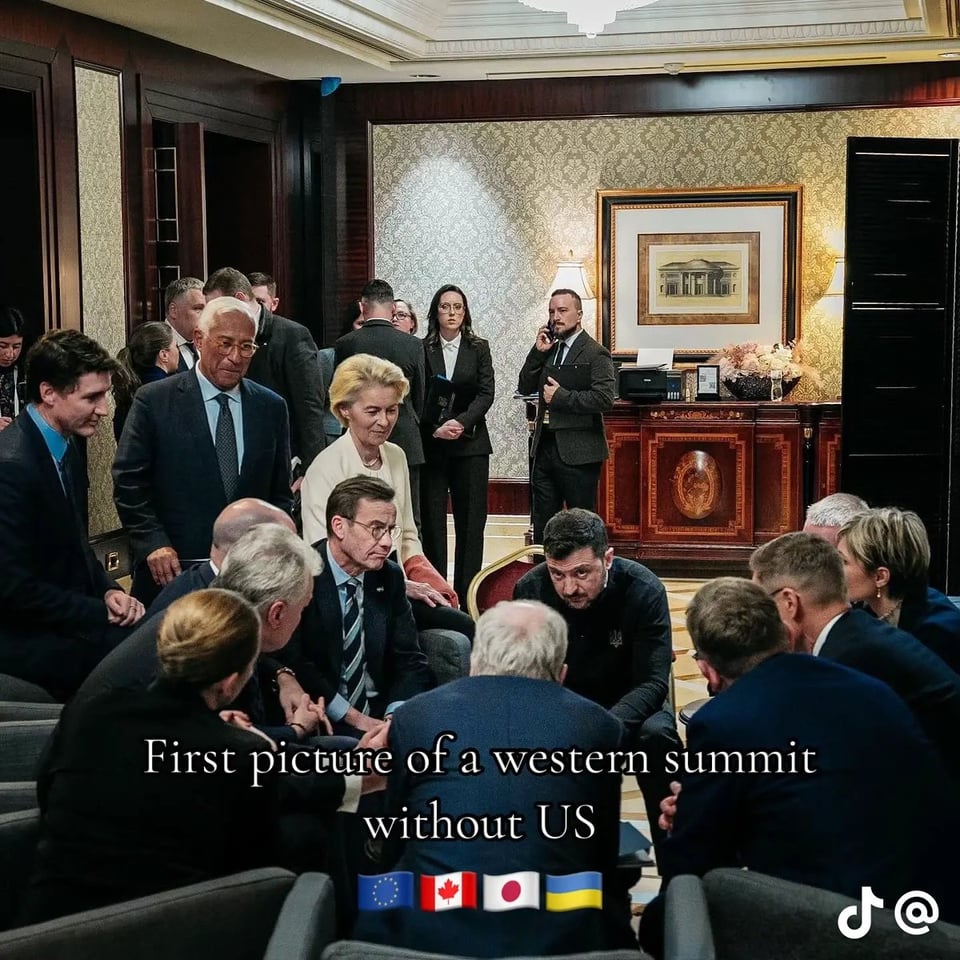
Tomorrow, President Zelenskyy of Ukraine comes to D.C.